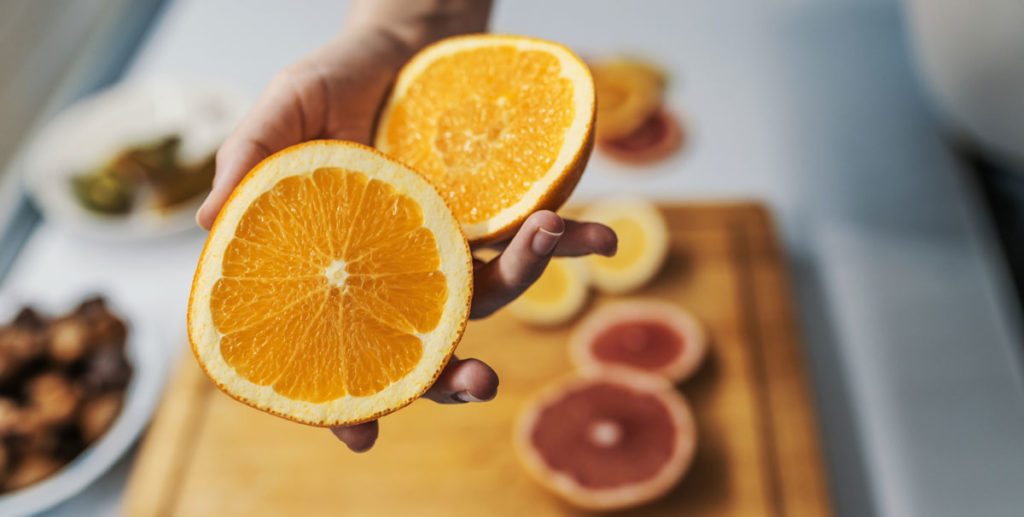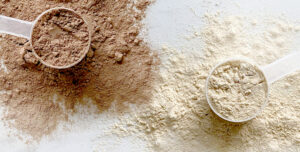Vitamin C is an essential nutrient. Vitamin C is also an antioxidant. Plus, it helps your body with nutrient absorption. So, let’s take a closer look at what vitamin C is, learn about vitamin C’s role in your body, and find out how much vitamin C you actually need on a daily basis.
What Is Vitamin C?
Vitamin C – or L-ascorbic acid, ascorbic acid, or L-ascorbate – is a water-soluble nutrient. Since your body doesn’t produce vitamin C, you need to get this essential nutrient every day from your diet in order to maintain adequate levels of vitamin C.
Vitamin C’s Role In The Body
Vitamin C is involved in many body functions.
Sources Of Vitamin C
Fruits and vegetables are the best sources of vitamin C, especially when you eat them raw. So, here are some of the top vitamin C foods to include in your diet:
- Red Bell Peppers: One cup of chopped raw red bell pepper contains nearly three times more vitamin C than an orange – around 200 milligrams.
- Green Bell Peppers: One cup of chopped raw green bell pepper contains less vitamin C than red bell peppers, but not too much less. Green peppers provide 120 milligrams of vitamin C, which is 200% of your recommended daily allowance.
- Oranges and Orange Juice: Oranges have the highest amount of vitamin C among citrus fruits. One medium whole orange contains around 70 milligrams of vitamin C. And an eight-ounce glass of 100 percent orange juice provides up to 125 milligrams of vitamin C since it’s a concentrated source of vitamin C.
- Grapefruit and Grapefruit Juice: One serving of grapefruit (half of the fruit) contains nearly 40 milligrams of vitamin C, while an eight-ounce glass of grapefruit juice provides up to 95 milligrams of vitamin C.
- Kiwifruit (Kiwi): A study found kiwifruit (or kiwi) to be an excellent source of vitamin C. Kiwis are also a good source of antioxidants and fiber, too. One kiwi (weighing 69 grams) provides 64 milligrams of vitamin C, which represents 71% to 85% of an adult’s daily vitamin C requirement.
- Brussels Sprouts: In addition to being loaded with phytonutrients and fiber, Brussels sprouts also contain 74.8 milligrams of vitamin C.
- Broccoli: A half cup of cooked broccoli has around 50 milligrams of vitamin C. This superfood is also low in calories.
- Spinach: Spinach is another superfood that’s loaded with tons of nutrients in a low-calorie package. A 100 gram serving of spinach contains 28.1 milligrams of vitamin C, which is 34% of the daily recommendation.
- Tomatoes and Tomato Juice: A large tomato contains 25 milligrams of vitamin C, or 28% daily value (DV). 100 grams of tomato juice also has 70 milligrams of vitamin C, which is 77% DV.
- Strawberries: One cup of strawberries contains 84.7 milligrams of vitamin C. This superfruit also offers healthy doses of folate and other compounds.
- Cantaloupe: In addition to its 30 milligrams of vitamin C per half cup, cantaloupe also contains a variety of nutrients, including B vitamins, potassium, magnesium, copper, and flavonoids.
- Baked Potatoes: A medium baked potato has about 20 milligrams of vitamin C. Potatoes are also an excellent source of potassium and fiber, as well.
Ways To Get More Vitamin C In Your Die
Getting the most vitamin C out of your daily diet doesn’t have to be difficult. Here are three easy ways to get more vitamin C in your diet.
Eat Your Fruits And Vegetables Raw: When you cook fruits and veggies, you strip the food of some of its vital nutrients. Cooking also greatly affects water-soluble vitamins like vitamin C. So, eat your fruits and veggies raw to get the most vitamin C out of your daily diet.
Get Creative With How You Eat Your Fruits And Veggies: Are you someone who doesn’t love eating fruits and veggies? Not a problem. Add pureed or grated fruits and veggies to recipes for muffins and soups. You can also add fresh or frozen berries to pancakes, cereal, and salads. Or you can make a fresh fruit smoothie instead.
*The links used in this article are being provided as a convenience and for informational purposes only; they do not constitute an endorsement or an approval by Iovate Health Sciences International Inc. or any of its affiliates (“Iovate”) of any of the products, services or opinions of the corporation or organization or individual. Iovate bears no responsibility for the accuracy, legality or content of the external site or for that of subsequent links. Contact the external site for answers to questions regarding its content.







